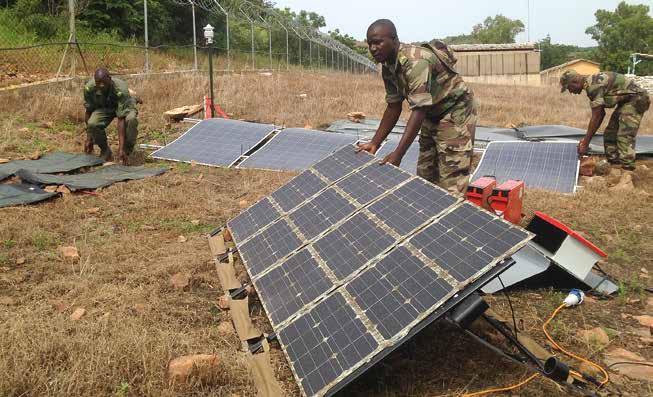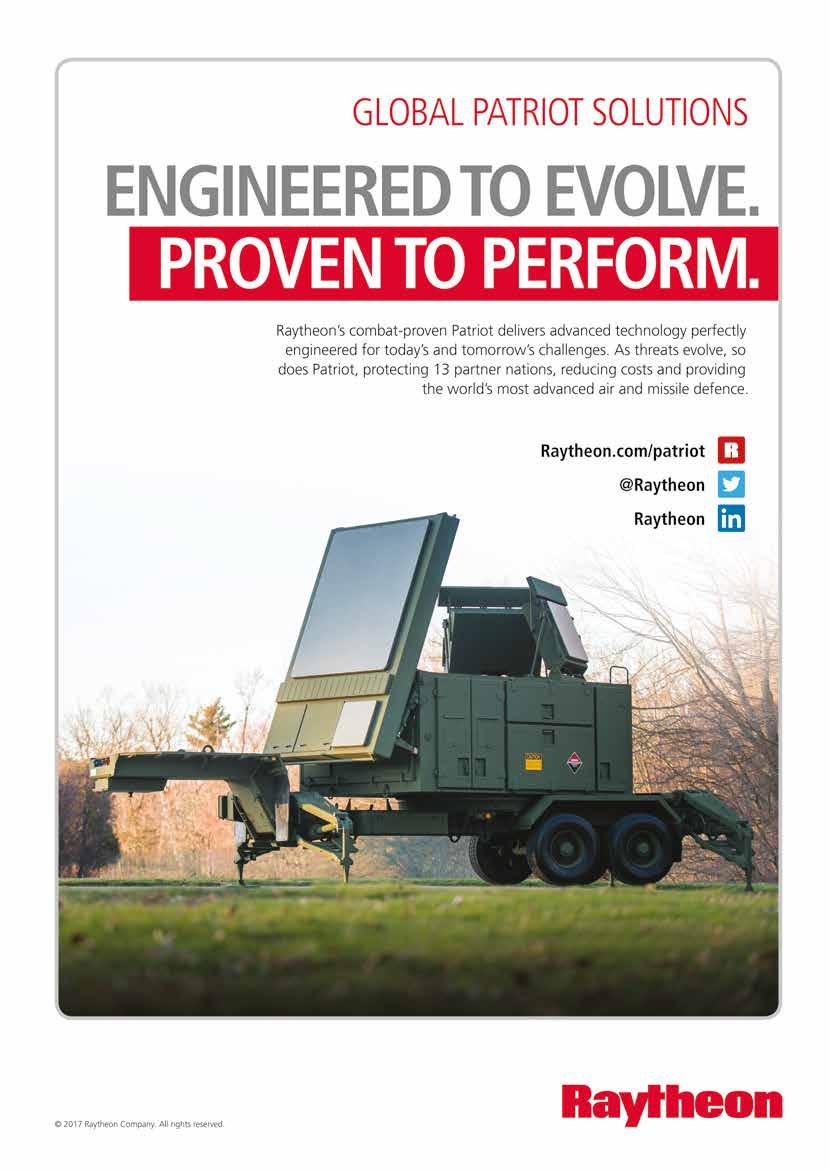
8 minute read
Interview with Denis Rogers and Richard Brewin, Brussels Powering military capability in a changing security environment Energy will continue to be a strategic priority
Energy is a strategic priority for the defence sector as an enabler of all military activities Powering military capability in a changing security environment Interview with Denis Roger, Director European Synergies and Innovation, EDA, and Richard Brewin, Project Officer Energy & Environment Systems, EDA, Brussels
The European: Gentlemen, I am grateful that you give me the opportunity to discuss with you about the European Defence Agency’s (EDA) approach on Synergies & Innovation and especially on the evolution in the energy sector, a field on which The European – Security and Defence Union has been accompanying EDA‘s energy activities since 2013.The new European Structural and Investment Funds (ESIF) would be very valuable for industries. Mr Roger, you are the director of EDA’s Directorate for European Synergies & Innovation (ESI). Your directorate promotes and supports innovative research and acts as an interface between defence ministries and wider EU policies that have implications for defence. Mr Brewin, you are the officer responsible for energy. Let me later come back to you for discussing on what is the precise objective of this programme.
Denis Roger has been Director European Synergies and Innovation (ESI) of the European Defence Agency since 2014. Graduating as an engineer from Ecole Polytechnique, and Ecole Nationale Supérieure de l’Aéronautique et de l’Espace and Stanford University, he held a range of international, R&T or industry-oriented positions in DGA (the French Defence Procurement Agency), at the European Commission, as the French Defence Equipment Attaché in Australia, as the Dean of Education and Research of a Technology Institute and for defence-related companies. Before joining EDA, Mr Roger worked in the department of the French Prime Minister as the Deputy Head, International, Strategic and Technological Affairs.
Mr Roger, could you inform us a bit about your directorate’s work? Denis Roger: The main missions granted to EDA by the Treaty on the European Union, focusing on cooperative defence capability and technological developments, have not changed, but the European Commission is becoming an increasingly important actor in defence. Consequently, beyond its traditional prioritisation and project promotion activities, EDA focuses increasingly on exploiting civil-defence synergies, minimising impacts of EU policies on defence operations and taking advantage of related opportunities. The ESI directorate has a coordination role in this matter, but all of EDA is involved in this evolution. Energy is a typical illustrative example with the Consultation Forum for Sustainable Energy in the Defence and Security Sector organised by EDA and sponsored by the Commission. (ed: see box on page 62)
The European: This is indeed a wide field. Trying to illustrate what you are responsible for, let us start with European Structural and Investment Funds (ESIF). How does EDA support access of defence industry to these funds? Denis Roger: In 2013 and 2015, EDA launched calls for projects responding to 22 technological priorities identified thanks to its expert networks called Capability Technology Groups (CapTechs). The selected projects received free of charge assistance and five of them have already received financial support from ESIF. EDA’s work demonstrated the eligibility of dual-use projects and contributed to pushing the boundaries. The Commission’s Defence Action Plan confirmed that ESIF might also be used in the defence sector.
The European: ESI supports EDA Member States in research and technology projects. What is the objective and how do you proceed as a partner of other EU Institutions in this sector? Denis Roger: EDA can rely on a wide network of governmental and industrial experts which have the main task to contribute to Defence R&T prioritisation and promote R&T projects in 14 different fields (12 CapTechs and 2 Working Groups on Energy and Cyber). Since the creation of EDA in 2004, about 200 projects representing 1 billion of funding by contributing member states have been launched.
The European: What is new with the development of a centralised EU Defence R&T funding?
souce:EDA
Richard Brewin is currently the EDA Energy and Environment System’s Project Officer with responsibility for chairing the Energy and Environment Working Group and managing the portfolio of projects including the Consultation Forum for Sustainable Energy in the Defence and Security Sector. He holds a M.Sc. degree in Ecology from the University of Wales and is a Chartered Biologist and Chartered Environmentalist. He started his career as an environmental consultant and joined the UK Department for Environment, Food and Rural Affairs in 1999. Prior to his current position at EDA, Mr Brewin held several positions at the UK Ministry of Defence, lastly as Sustainable Procurement (SP) Lead and Sustainability Specialist Fellow.
“Recent and ongoing projects in line with EDA’s Capability Development Plan include a Smart Energy Camp Technology Demonstrator. ” Richard Brewin
Denis Roger: It started in 2015 with the pilot project (3 activities in progress for a total of 1,3 M) and is continuing with the Preparatory Action on Defence Research (90 M planned, first calls published on 7 June) prefiguring a wider European Defence Research Programme. Adapting to this new context, CapTechs and Working Groups are increasingly proposing relevant topics to various funding instruments not limited to EDA’s framework and including Commission’s ones.
The European: Is there an overarching strategic approach? Denis Roger: Indeed, EDA is elaborating an Overarching Strategic Research Agenda (OSRA) which aims at being the EU-level reference for defence technological priorities as the Capability Development Plan (CDP) is for capability priorities. This intergovernmental prioritisation role of EDA is essential and was reaffirmed recently in the conclusions of a Long Term Review exercise endorsed by Ministers of Defence.
The European: I now would like to address to you Mr Brewin. ESI also deals with the Agency’s energy and environmental activities. You are the officer responsible for energy. In 2014 EDA set up its Energy & Environment programme.What is the precise objective of this programme? Richard Brewin: One of EDA’s priorities is addressing energy risks and opportunities as set out in the CDP. This is managed through the Energy and Environment Programme, which seeks to integrate innovative energy efficiency and renewable energy technologies across the spectrum of military capabilities in all operating domains, while developing military capability perspectives on wider defence sustainability considerations.
The European: This corresponds to the objectives of the EU Global Strategy. Richard Brewin: Indeed, the EU Global Strategy explains that energy insecurity and climate change are among the risks which effect national and international security. While energy and environmental considerations will not result in the need for a completely new suite of platforms, they will influence the shape of through-life military capability requirements and defence budgets. Finding innovative and sustainable solutions to improving the energy performance of military equipment can contribute to enhancing military capability while helping to manage cost and other risks.
The European: How is the stakeholder management conducted? Richard Brewin: It is managed through the Working Group Energy and Environment (WG EnE) which has members from EDA’s participating Member States (pMS), the European Union Military Staff, and the European Commission. On an ad hoc basis, representatives have attended from NATO Energy Security Centre of Excellence to ensure an approach of complementary and cooperation is maintained with NATO, as well as from the defence technological and industrial base.
The European: And all this is coordinated with your CapTechs? Richard Brewin: The WG EnE works in parallel to the EDA’s Capability Technology groups given the cross-cutting nature of the work and generally focuses on project solutions which are at higher technology readiness levels.
The European: You mentioned that you are following priorities laid out within EDA’s Capability Development Plan. Could you elaborate? Richard Brewin: Recent and ongoing projects include a Smart Energy Camps Technology Demonstrator which was installed in the European Union Training Mission, Mali. This tested
Assembly of the EDA Smart Energy Camp Technology Demonstrator in Mali

Source: EDA
62 smart energy demand monitoring and management technologies, energy storage, and the potential for renewable energy technologies integration. And we have the Smart Blue Water Camps which involve Greece as the lead nation, as well as Cyprus, Ireland, Italy, Portugal, and Spain. Each country has put forward a military site to be investigated for water management improvements from sustainability, technological, and hydro-informatics perspectives. Finally the Defence Energy Managers’ Course is developing a defence focused training course based on ISO 50001, Energy Management Systems.
The European: All these activities are directed to energy efficiency Richard Brewin: For sure, in the first of its kind, the Consultation Forum for Sustainable Energy in the Defence and Security Sector is a DG Energy funded and EDA led initiative investigating energy efficiency and renewable energy systems for use in fixed military infrastructure, and the protection of critical energy infrastructure. New Energy storage using complex hydride Tanks for thermos-neutral (NEXTT) systems is developing a new energy storage system for hydrogen. EDA is also working with pMS to support the development of a common approach to energy data collection and analysis. And we have the Energy Strategic Research Agenda which consisted of technology assessments of civilian technologies for potential military uses.
The European: Gentlemen, we spoke of priorisation. What is the place of energy? Denis Roger: Energy will continue to be a strategic priority for the defence sector. As an enabler of all military activities it should increasingly be treated and managed as a capability in its own right. Managed properly, energy provides significant opportunities for the defence sector to save costs and lives, while delivering enhanced military capability to meet mission requirements.
The European: Thank you, Gentlemen, for this interview.
► Information
Consultation Forum for Sustainable Energy
The Consultation Forum for Sustainable Energy in the Defence and Security Sector is a European Commission initiative managed by EDA over 24 months. It brings together experts from the defence and energy sectors to share information and best practice on improving energy management, energy efficiency, and the use of renewable energy. The work is carried out in three parallel working groups each with a particular focus: energy management, energy efficiency, and renewable energy. After the first, second and third events held in Brussels, Dublin, and Rome in 2016, the 4th edition took place in May 2017 in Lisbon. The fifth Consultation Forum was held in Thessaloniki from 19-21 September 2017.












